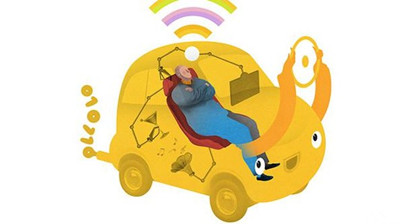(单词翻译:单击)
中英文本
The future of cars
汽车的未来
Wireless wheels
无线互联汽车
Connected cars will make driving safer, cleaner and more efficient. Their introduction should be speeded up
联网汽车将让驾驶更安全、环保、高效。应当加快介绍推广。
SINCE Henry Ford turned it into a mass-market product a century ago, the car has delivered many benefits. It has boosted economic growth, increased social mobility and given people a lot of fun. No wonder mankind has taken to the vehicle with such enthusiasm that there are now a billion automobiles on the world's roads.
一个世纪之前,亨利福特实现了汽车的大规模生产,自那以后汽车就就给我们带来了诸多好处。它的出现促进了经济增长,增加了社会流动性,也给人们带来了很多乐趣。这也就难怪人们对汽车会如此情有独钟了,因而现在有十亿量汽车奔驰在世界各地的道路上。
But the car has also brought many problems. It pollutes the air, creates congestion and kills people. An astonishing 1.24m people die, and as many as 50m are hurt, in road accidents each year. Drivers and passengers waste around 90 billion hours in traffic jams each year. In some car-choked cities as much as a third of the petrol used is burned by people looking for a space to park.
但是汽车也带来了很多问题。它会污染空气,造成交通拥堵,带来人员伤亡。在每年发生的交通事故中死亡人数高达124万人,也有500万人因此受伤。每年驾驶员和行人因为交通堵塞浪费的时间约为900亿小时。在一些汽车密集的城市,有三分之一的汽油是用在了找停车位的路上。

Fortunately, an emerging technology promises to make motoring safer, less polluting and less prone to hold-ups (seeTechnology Quarterly). “Connected cars”—which may eventually evolve into driverless cars but for the foreseeable future will still have a human at the wheel—can communicate wirelessly with each other and with traffic-management systems, avoid pedestrians and other vehicles and find open parking spots.
幸运的是,一项新兴的科技使得汽车更加安全,更环保也不易造成交通堵塞(另见科技季刊)“联网汽车”可能最终会进化为无人驾驶,但是短时间内还是需要人来驾驶,并且能通过无线网络去其他车辆和交通管制系统和相连,还能规避行人、车辆,找到开放的空车位。
Get smart
智能化
Some parts of the transformation are already in place. Many new cars are already being fitted with equipment that lets them maintain their distance and stay in a motorway lane automatically at a range of speeds, and recognise a parking space and slot into it. They are also getting mobile-telecoms connections: soon, all new cars in Europe will have to be able to alert the emergency services if their on-board sensors detect a crash. Singapore has led the way with using variable tolls to smooth traffic flows during rush-hours; Britain is pioneering “smart motorways”, whose speed limits vary constantly to achieve a similar effect. Combined, these innovations could create a much more efficient system in which cars and their drivers are constantly alerted to hazards and routed around blockages, traffic always flows at the optimum speed and vehicles can join up into “platoons” on the motorways, travelling closer together, yet with less risk of crashing.
转型中的某些部分已经到位。 许多新车都安装了新的设备,这些新设备能保持车距,并让车辆以一定的速度自动保持在高速公路车道内行驶,也能识别到空车位插入。这些汽车也搭载了移动电信链接设备:很快,如果欧洲新车的机载传感器检测到碰撞时,那么它们必须能够触发应急服务。 新加坡在控制交通拥堵上走在了前面,通过浮动收费的方式保障高峰时段车流的顺畅通行; 英国则是采用“智能高速公路”的先驱,通过对汽车行驶速度的浮动限制达到与新加坡的方法类似的效果。 综合所有这些创新手段就可以创造一个更有效的系统,在这个系统下不论是汽车还是驾驶员都能不断的得到风险警告并避开拥堵路段,使得车流始终保持在最佳速度,所有车辆都能加入成排得行驶在高速公路上,车距小但是发生车祸的风险更小。
Just as regulation has helped increase fuel efficiency, cut exhaust fumes and introduce anti-skid equipment, so government involvement is needed to get the connected car on the road. It is beginning to happen. Earlier this year, Europe's standards-setting agencies agreed a common set of protocols for cars and traffic infrastructure to communicate. Others should follow. Governments should then set firm deadlines for all new cars to be fully connected and capable of platooning, and a date for existing cars to be retrofitted with a basic locator beacon and the ability to receive hazard warnings.
正如监管有助于提高燃油效率,减少尾气排放并引进防滑设备,那么为了让更多的联网汽车上路,政府的参与也是必要的。 这也已经开始了。今年早些时候,欧洲的标准制定机构同意为汽车及交通基础设施之前的通信制定一个共同的协议。 其他的也都将按此执行。各国政府也应设定所有新车联网和成排管理的最后期限。并为现有的汽车设定一个期限完成基本的定位改装,能够接受危险警告。
If cars are to connect, new infrastructure will have to be built. Roads and parking spaces will need sensors to monitor them; motorways will need dedicated lanes for platooning. But this will not necessarily be expensive. Upgrading traffic signals so they can be controlled remotely by a central traffic-management system is a lot cheaper than building new roads.
如果汽车都连了网,那么也需要修建新的配套基础设施。 道路和停车位都需要传感器来来监控; 高速公路需要专用车道来成排管理。 但是这并不需要投入大量资金。更新交通信号使他们能够通过一个中央流量管理系统远程控制,这比起新建道路便宜不少。
The sooner these changes are made, and cars are plugged into a smart traffic grid, the quicker Singaporean variable pricing—for parking as well as road use—can become the norm. Motorists will then have the incentive, as well as the ability, to avoid the busiest places at the busiest times, and the dreadful toll that roads take in human lives should start falling.
如果能越早完成这些改进,将汽车连接到智能交通网格,那么新加坡施行的停车和道路浮动收费的方法将会成为常态。 那么驾驶员将有动力也有能力在高峰期避开拥堵路段。那么人们生活中可怕的交通费支出也会下降。
In the past, more people driving meant more roads, more jams, more death and more fumes. In future, the connected car could offer mankind the pleasures of the road with rather less of the pain.
在过去,开车的人越多意味着更多路也更添堵。因为车祸死亡的人也会更多,尾气也更多。而在未来,联网汽车可以在让人们享受奔驰在路上的同时少一些痛苦。
词语解释
1.turn into 变成;进入
They turn into this street.
他们也转到这条街上。
But that goal would itself involve a more expensive capital structure in the form of a layer of debt that can turn into equity in an emergency; it is in any case a long way from being reached.
然而,这个目标本身就需要在债务层建立一个更昂贵的资本结构,以确保紧急情况下这些债务可以转变为可用资金。 所以,要达到这一目标,还需要很长的路要走。
2.as many as 多达;和…一样多
But not for as many as we would like to think.
不过这样的情侣并没有我们想象得那么多。
You no longer see as many as you did at meetings or gatherings.
你在开会或者聚会的时候,不再看到像以前那么多朋友。
3.look for 寻找
What do they look for inside of those modules?
它们会在这些模块内寻找 什么?
For every should you come across, look for the preference underneath.
你每遇到一个应该,要寻找隐藏其下的喜好。


